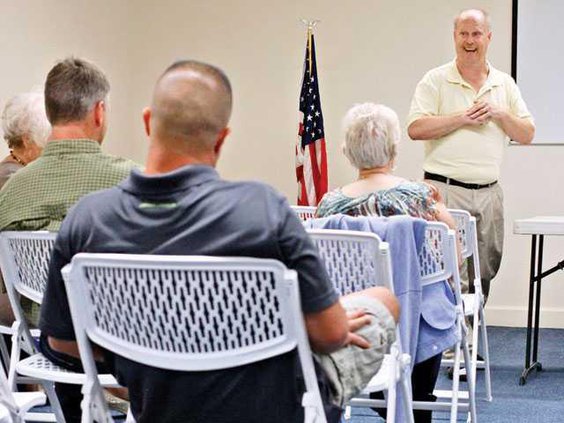As goes Washington, D.C., so goes the nation.
At least that’s the interpretation of Manteca TEA Party Patriots founder Dave Marks of the recent decision by a federal judge to overhaul the ban on handguns in the nation’s capital. It is the latest in a series of legal rulings that could have sweeping implications for gun advocates and policy in the United States.
After a scheduling mix-up precluded the scheduled speakers, the owners of Manteca’s Elite Arms from making it to the meeting, Marks stepped in to give an overview of the situation that is developing in Washington, D.C., and the possibilities that could come as a result.
And it’s a matter that could be headed to the Supreme Court.
In February California’s typically left-leaning Ninth Circuit Court of Appeals ruled that the “just cause” section of the state’s concealed weapons permit process was unconstitutional as it gave selected individuals – county sheriffs and individual police chiefs – the ability to determine who qualified for such a permit at their own discretion.
The decision, which has been challenged by California Attorney General Kamala Harris, could end up leading to the first decision by the high court on individual gun rights since a pair of landmark rulings – McDonald vs. Chicago and The District of Columbia vs. Heller – asserting that law-abiding citizens have the right to own guns in 2008 and 2009, respectively.
Marks said U.S. District Court Judge Frederick Sculling ruled that the outright ban on handguns was illegal under the constitution. In addition to granting citizens the right to carry guns, Sculling’s ruling also addressed the issue of cross-state transfers and the legality of permit transfers and jurisdictions.
There is no reason, according to Marks’ interpretation of the ruling, that people shouldn’t be allowed to have guns “at the ready” – whether it be a handgun carried on one’s person in a vehicle – and no reason why a permit issued in one state or jurisdiction, if required at all, should not be applicable in another.
Reciprocity, Marks said, should be the order of the day.
After striking down the ban, Sculling granted a 90-day extension where D.C. officials will have the opportunity to determine whether they’re going to challenge his ruling or create a law that will pass constitutional muster.
Whether the law will be retroactive will also come into play.
Just three days before the ruling a North Carolina State University trustee was arrested at the U.S. Capitol building for carrying a concealed 9mm handgun in a bag. His attorney is currently negotiating with prosecutors, and instances like his, Marks said, could prove to be the litmus test for which all other gun laws are applied.
Last month California Governor Jerry Brown signed three new California gun laws into effect – one which will overhaul the state’s ineligible purchasing database, one that will change the reporting requirements for people who are deemed mentally incapable of owning a gun and one that overhauls the safety indicator mechanisms for handguns.
A decision regarding whether the Supreme Court will hear a challenge to the Ninth Circuit decision won’t come until the entire court, and not just the judge panel that issued the initial ruling, holds an en banc hearing.






